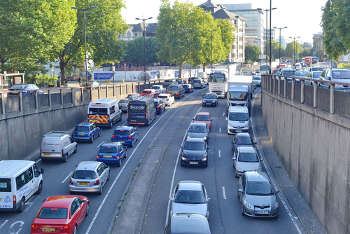Bristol City Council has missed another Government deadline for progressing its plans to tackle illegal air pollution but ministerial threats of legal action have still come to nothing.
Bristol has been under government pressure for some time to speed up its work to bring levels of nitrogen dioxide within legal limits, with little progress since the council’s strategic outline business case was approved by ministers in March 2018.

Traffic in Bristol
In January environment minister Dr Thérèse Coffey warned its mayor, Marvin Rees, that all necessary public consultation on its preferred scheme should commence by 29 March, with a full business case by 27 September.
In April, Mr Rees suggested the Joint Air Quality Unit (JAQU) had agreed to relax this deadline, with the council submitting an outline business case in September and a full business case by the end of the year.
On Monday a Bristol City Council spokesperson told Transport Network: ‘We are working on proposals to go out to consultation in the summer, with a view to a Cabinet decision in September to submit an outline business case to Government.
‘We are committed to tackling air pollution in a way that protects public health and reaches compliance with legal standards, while maintaining our aims to build a city where nobody is left behind.’
Defra declined to clarify whether Mr Rees’s suggestion that officials had agreed to a relaxation of Dr Coffey’s deadline was correct.
Noting that Bristol’s plan is still outstanding, it said that ministers have 'engaged closely' and are considering suitable further action to accelerate progress and ensure compliance is not delayed.
The council’s reference to nobody being ‘left behind’ reflects Mr Rees’ previously expressed concerns that some measures could mean ‘adverse impacts on the lowest income families’.
Mr Rees said the council’s proposed initiatives including a local scrappage scheme, increased usage of a freight consolidation facility, a charge for the most polluting buses, taxis, HGVs and LGVs and further bus improvements.
This suggests that Bristol will introduce a charging Clean Air Zone (CAZ) that will exclude private cars – one of the options in last year’s plans.
Separately, Dr Coffey has rubber stamped Derby City Council’s air quality plan, which does not include a CAZ, despite Derby being one of five councils the Government initially planned to direct to introduce one.
A ministerial direction states that the council’s plan for NO2 compliance was approved by the secretary of state on 13 May and ‘must now be implemented to ensure compliance with the legal limit value for NO2 is achieved in Derby in the shortest possible time’.
The plan includes traffic management at signal junctions and Intelligent Transport Systems wider network management including junction alterations on specified routes and traffic management measures on alternative routes such as including waterproofing, resurfacing and surface dressing works.
A spokesperson for Derby City Council said: ‘We welcome the outcome of the ministerial decision and remain fully committed to meeting our legal duty to reduce roadside NO2 emissions at the site of exceedance.
‘We are beginning preparations to implement the plans laid out in the business case and we continue to work with JAQU on some of the funding details and priorities to achieve compliance in the fastest possible time.’
Register now for full access
Register just once to get unrestricted, real-time coverage of the issues and challenges facing UK transport and highways engineers.
Full website content includes the latest news, exclusive commentary from leading industry figures and detailed topical analysis of the highways, transportation, environment and place-shaping sectors.
Use the link below to register your details for full, free access.
Already a registered? Login